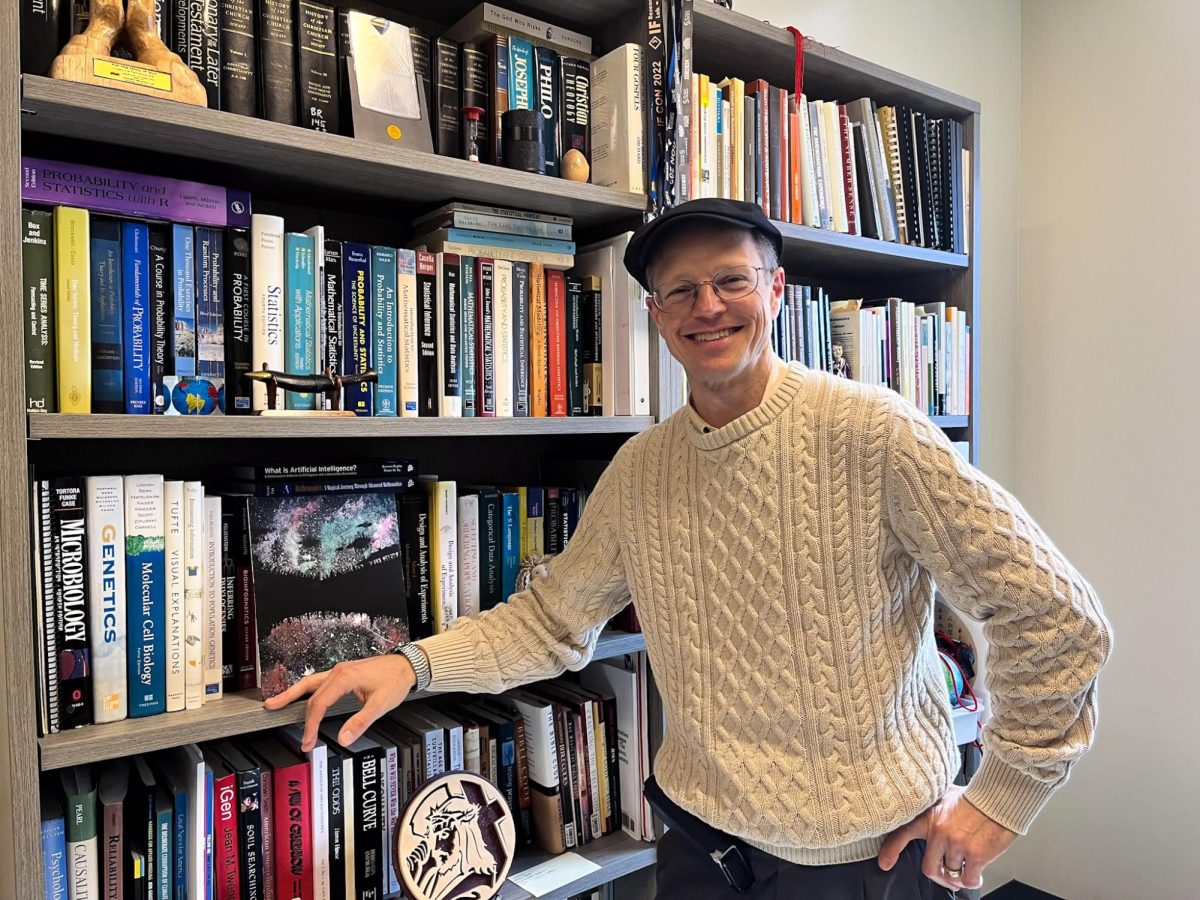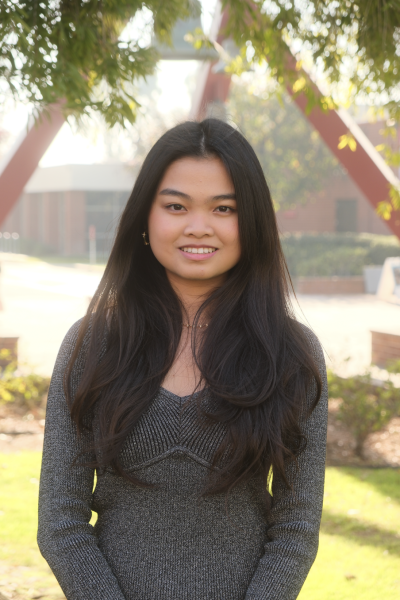“Between the Pages” is a Q&A series that explores one’s life through books that have shaped and influenced them. Books affect the forming of souls, and together these souls make up our community. Through both ancient and contemporary writings, we unveil the glimpse of wisdom that underlies the heartbeat of our community.
To commence this series, we’ve invited mathematics professor Jason Wilson to share his must-reads, favorite authors, fiction picks, rereads and more. Wilson has 20-plus years of teaching experience and holds two master’s degrees in New Testament Studies and Applied Math. He has also pursued a PhD in Applied Statistics at the University of California, Riverside (UCR).
Disclaimer: The answers have been edited for clarity and conciseness without altering the original meaning of the transcript.
What book(s) are you currently reading, and what drew you to it?
Jason Wilson: “Confessions of an Economic Hit Man” by John Perkins. The book is about this guy who was hired by a major US firm in the late 60s to become an economics supervisor and go into developing third-world countries and pitch them a proposal. “We’ll arrange for you to get loans from the World Bank and all these US corporations to come in and do infrastructure projects for you.” But what they didn’t say was, “We are going to frame it so that it’s going to indebt your country at such a high level that you’re not going to be able to recover, and we’re going to gain control over you.”
I’ve been concerned about some things in the direction of our country right now with not only the political stuff that’s out on the surface, but some things that beg there’s more going on behind the scenes that are not entirely clear. Such as the levels of censorship that we have faced and looking for some history, perspective and framing about why are we at the place we’re at.
Is there a book you find yourself rereading regularly? Why does it resonate with you?
Wilson: My most common rereads are going to be some of the Christian mystics. Saint John of the Cross wrote a two-part book. The first part is the “Ascent of Mount Carmel” and the second is “The Dark Knight of the Soul.” Those two are a united work that talks about the contour of the spiritual life, and he’s able to talk about the mechanisms of spiritual growth in a way that I’ve never read anybody else write about, including modern writers.
“Autobiography of Madame Guyon” — she was a French mystic in the 1700s. Her life is just phenomenally powerful. A lot of the mystics were either monks or nuns. She had such a zealous pursuit of God and the level of sanctification she achieved in her life and the resultant impact on the people around her is profound. She has a phenomenal way of articulating prayer and encouraging you into the depths of prayer. The title of one of her works is “Experiencing the Depths of Jesus Christ.”
What is your favorite fiction book, and what do you love about it?
Wilson: I’ll pick something that’s a lesser-known book. My favorite fiction genre is fantasy. One of my good friends that I met in seventh grade is a fantasy fiction author, his name is Paul Genesse. His series is called the “Iron Dragon series.” He’s only published the first three out of five. He is a Tolkien aficionado and extremely well-read in fantasy literature.
What are some essential books you recommend for students interested in the integration of faith and math?
Wilson: “Math Through the Eyes of Faith” by Russell Howell and James Bradley. They’ve crafted their chapter down to where they’ve distilled out the topics, and each chapter’s on a different topic, such as chance, probability, infinity, dimension, etc. For someone particularly interested in mathematics and postmodern age: it’s by the same two authors called “Mathematics in a Postmodern Age: A Christian Perspective.”
Another one, “The Faith Equation” by Marvin Biddinger.
There’s not a lot written on this specific subject, I’m actually working on a book called “Statistics and Faith.”
What books shaped you the most during your college years?
Wilson: I would like to just note that people shaped me more than books. But there are some key books. One would be Dallas Willard, “The Spirit of the Disciplines.” I put that on a must-read for every Christian. He was a pastor for a season, and he became a philosophy professor at University of Southern California (USC). He’s drawing from ancient wisdom in a contemporary context from a very gifted pastoral intellectual.
Richard Foster, “Celebration of Discipline,” is also certainly on the classic list. Each chapter is a different spiritual discipline such as prayer, fasting, study, service, silence, etc.
What book did you wish you had read earlier in life or during your studies?
Wilson: The book I mentioned at the beginning, “Confessions of an Economic Hitman.” I wish I had read that years earlier, because if you ask me about 20th-century world history, such as post-World War II, Vietnam War and the Korean War and what the U.S. involvement was, I only know rough details and there’s a lot of fuzz to it. It’s intentionally fuzzy because there were some really, really bad things that our country participated in and don’t want a clear story behind that out there. This book, “Confessions of an Economic Hitman,” he was involved and able to articulate what was going on.
What book or author influenced your decision to pursue your academic discipline?
Wilson: “Understanding Basic Statistics” by Brase and Brase. I learned a dimension of statistics from that book that really attracted me.
What book has most challenged your faith, and how did you grow through that experience?
Wilson: “The Life of St Teresa of Avila by Herself,” and she is another mystic from the 1600s and was instrumental in the life of St. John the Cross. I read that book during a season when I was going through a proverbial spiritual valley/drought. Her book was really helpful for the experiences in prayer that I never encountered before.
What advice would you give to students who are looking to improve their writing?
Wilson: In humanities, you’re aiming to write — and I don’t mean this to be a caricature – a flowery, big word paper and so on. I had a pretty strong high school English literature background and Masters in New Testament studies and Math. So I learned how to write that way, to include emotion and pathos. In the sciences, however, you do not write that way. You want to strip the emotion out and get it boiled down to as clear, concise and precise as you possibly can. So, figure out what kind of writing you’re doing and learn to do that well.
Second, be willing to receive feedback. In the earlier part of my academic career, I was more prideful and took feedback as a personal comment rather than to improve. So I didn’t and that was to my detriment.
What reading habits do you recommend to students?
Wilson: For the Bible, cultivate your personal relationship with God and the time that you spend in that should be separate from time in doing homework for Bible classes. Maybe you incorporate devotional along with the Bible so there’s little teaching and exhortation coming in or maybe not. It’s going to depend on how you are, your community and situation.
I recommend making a conscious or intentional decision about reading. If you look at all the ways of acquiring new knowledge, book reading ranks really high in that area. And I’m talking about nonfiction books. There’s certainly a role for fiction, but I would recommend for students in particular be thinking in terms of the nonfiction reading. Maybe you won’t read it this semester, maybe it’s for the summer, but make a conscious decision to do it. And then along with that, have a reading list. Another advice is to make use of the library, less cost commitment.
What have you been learning about life and faith?
Wilson: The Lord’s been teaching me how I need to depend on him even in the face of injustices done to me. For people that I’ve been closely trusting but violated that trust, that’s the most painful thing I’ve ever experienced in my life. Do I lash out? Do I just sever the relationship? [That] would have really negative consequences. God’s taking me through a season of confronting all the natural, fleshly responses in myself to that. 2 Corinthians 1:3-5 says, “I praise God, the Father of all comfort, who comforts us in all of our afflictions, so that we may be able to comfort you with the comfort with which we are comforted.” So even though it’s very painful in the flesh, it’s invaluable in the spiritual.






